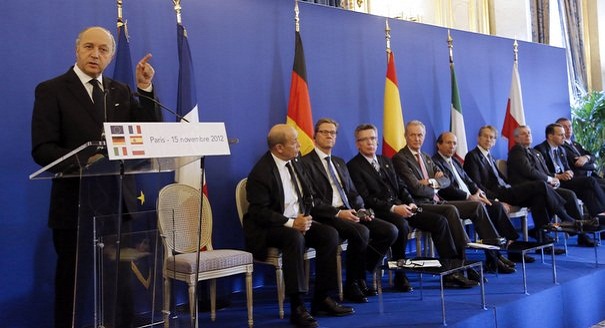Whenever the business of European integration gets tough, it is a time-honored reflex to hope for an elite of more cooperation-minded EU member states to form an ad-hoc group to press ahead with more integration against the reluctance of the rest of Europe. This concept of a pro-European avant-garde is at the core, of course, of all thoughts of multi-speed Europe.
While generally in vogue at the moment for obvious reasons, the avant-garde idea is particularly popular in the field of foreign and security policy. Common Foreign and Security Policy (CFSP) is the EU’s least integrated policy field, and the one where interests and ambitions diverge in the most obvious way. CFSP is also the policy field where hopes ran especially high after the ratification of the Lisbon treaty, and consequently where pro-European expectations have been the most thoroughly disappointed. This sentiment has been compounded by an extra layer of disappointment with all matters related to closer cooperation on military and defense issues, which, in many ways, is the true litmus test for how serious Europe wants to become as a viable international player.
At a recent workshop hosted by the London office of Germany's Konrad Adenauer Foundation, the question of a possible avant-garde in European defense was high on the agenda. Would America's pivot away from Europe, tighter budgets, and the lessons of NATO's mission in Libya lead to a sense of urgency on defense matters in Europe? Was there a possibility for an avant-garde to form and lead the way for closer EU defense cooperation?
In the debate, it soon became clear that the traditional way of thinking about a defense avant-garde, which is based on the assessment of defense capabilities, is no longer useful. It is no longer those countries with sizable militaries that form the elite, but those that ask the crucial question: what do we actually want to achieve with these assets?
In a remarkable departure from traditional defense thinking, it is now intellectual investment that counts more than defense spending alone. By this definition, Europe is in trouble. The level of ambition in Europe is generally low, with the debate about common goals and objectives crassly underdeveloped. Moreover, the three countries that still have sizable militaries don't see eye to eye on fundamental questions. This forms the biggest obstacle to a much-needed strategic debate in Europe.
In another most welcome departure from obsolete thinking, most participants in the workshop agreed that European institutions, or a lack thereof, are not the crucial problem for European Security and Defence Policy. There was neither the feeling that there are too few institutions, nor that some of the unused ones, specifically the treaty option of Permanent Structured Cooperation in Defence, are particularly useful in addressing Europe’s foreign policy shortcomings.
So, if it is no longer possible to hide behind the straw men of capabilities and institutions, what is the real issue? In what can only be described as a healthy dose of realism, the debate returned to the question of what Europeans, as providers of military services, actually want. Although this question might sound banal, it is crucial, and curiously absent from the debate.
Under normal circumstances, two factors determine what one wants: the external question of need—what is dictated by circumstance—and the intrinsic motivation—what one aspires to. Europe is torn on both. There is no consensus on what the needs for European defense will be in the new emerging world order. Participants at the workshop could agree neither on what impact the U.S. re-balancing to Asia would have on Europe, nor on where European interests lie or how much of a stakeholder Europeans are in global affairs. And there is most certainly no consensus on what we, as Europeans, should aspire to, even in the most general terms. To top it all off, these are not normal circumstances. The protracted economic and political crisis in Europe not only makes budgets tighter, it also takes a mental toll. Who cares about EU foreign and security policy when Europe's internal affairs are in tatters?
Where, then, will the impetus come from to overcome the deadlock? Most participants agreed that Britain would have to play a key role in it. Only Britain possesses all three factors that are needed: the assets, the ambition, and a strategic mindset to think in global terms. Britain's problem, of course, is, that it does not connect any of these attributes to the rest of Europe. Defense cooperation with France is strictly bilateral. Britain still feels that enhanced EU defense cooperation might endanger NATO, and British nationalism still dreams of a UK that can be a relevant global player all by itself.
That Britain is still looking for its role, as a standard phrase has it, is a huge disappointment for all interested in a bigger role for Europe in the world. In this part of the EU project specifically, Britain is indispensable. But maybe not all is lost yet. Participants at the workshop, including all British participants, basically agreed that the power of geopolitical realities will sooner or later lure the Brits back to the continent—because there really is no other choice.
The realization that Europe needs to think about what it wants and needs to achieve as a foreign policy entity has clearly come. The sooner Britain figures out what its own role in Europe ought to be, the sooner it can help guide the rest of the continent on this big question. Even the avant-garde needs to do its homework.






